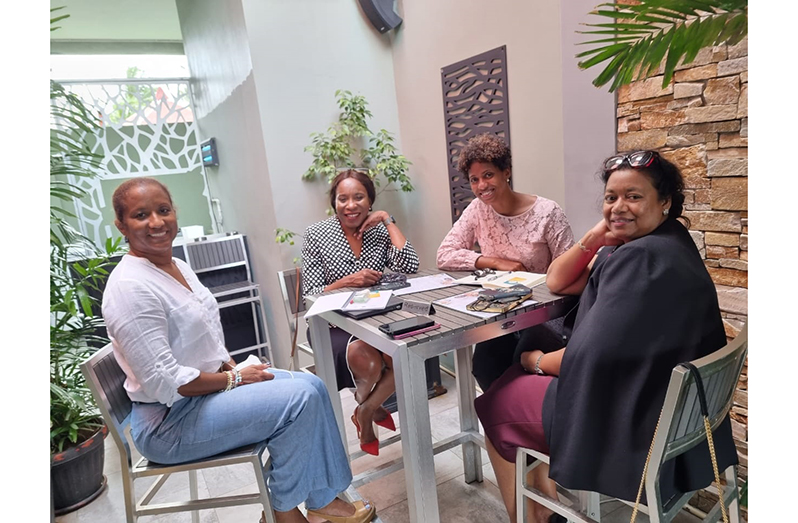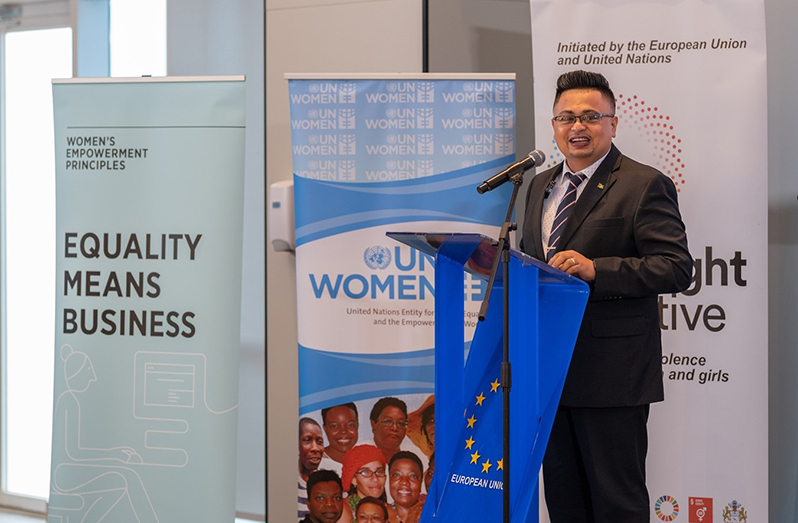THE growing momentum across the private sector in Guyana to address issues surrounding violence against women and girls is clear to see, and although much work remains to be done to champion the end to such issues, UN officials are saying that the country has been taking the right steps in the right direction.
For one thing, many organisations within the private sector have been looking internally to see how they can strengthen in-house systems to address head-on the scourge that women have been dealing with over the decades.

For example, just recently, 14 private sector companies (with three more to be added soon) signed on to the Women’s Empowerment Principles (WEPs). WEPs were originally launched in 2010 by UN Women and the UN Global Compact to offer guidance to businesses on how to promote gender equality and women’s empowerment in the workplace, marketplace and community.
The WEPs were recently launched here in Guyana under the EU-funded Spotlight Initiative to increase awareness of the role of the private sector. At this launch, the local companies – ranging from the banking, food, private security, and education sectors, among others – announced their commitment to implementing WEPs.
In WEPs, specific workplace policies must be put in place to support survivors and victims of intimate partner violence and address sexual harassment.
“Looking at sexual harassment in the workplace, gender-based violence in the workplace, lack of equal pay for equal work, lack of promotion around representation at the highest levels of the organisation; these are the most obvious reflections of gender inequality and violence in the workplace,” Tonni Brodber, Representative, UN Women Multi-Country Office (MCO) – Caribbean, shared with Pepperpot Magazine.

In an interview a few days ago, the UN official also spoke about the causes of such issues. “We do not necessarily value yet as a society the work that is unpaid care work, unpaid domestic work; the work that usually falls on women. As a result, women are not necessarily given opportunities for promotion because they are balancing a dual workload, and we are not necessarily encouraging men in our society to engage in sharing the care.” In fact, before the COVID-19 pandemic, Brodber pointed out how women were doing three times more unpaid domestic work than men across the Caribbean and Latin America.
As for sexual harassment, she noted that while workplace relationships have been happening over the years, it is critical to have clear policies that protect employees and put them on the same page regarding what is acceptable and what is not.
And this is where WEPS can make a difference in the workplace. “It’s one thing to tell people that they should be doing something; it’s another thing to say this is how you can do it. That’s what WEPS do in a simple, accessible way,” Brodber pointed out.

Everyone suffers when there is gender inequality, she posited. “When you look at the data in Guyana around labour force participation, around rates of violence, around femicide, we see that we have to still look at women’s empowerment. This is not about taking away power, it is about addressing the fact that if we do not have more equality as it pertains to access to resources, to skillset; equality in terms of people feeling dignity, access to justice, social protection, we are not going to be able to thrive as a society. So, focusing on women’s empowerment is not a detractor from the issues; it is a core issue to empower our countries today. You empower a woman; you empower a family.”

Meanwhile, at the launch of WEPS here recently, Deputy Head of Delegation of the European Union to Guyana, Suriname and with responsibility for Aruba, Bonaire, Curaçao, Saba, St Barthelemy, St. Eustatius, and St. Maarten, Ms. Evelina Melbarzde commended the UN and government on the collaboration with a wide group of stakeholders towards preventing and eliminating violence against women.
The activity was conducted within the framework of Pillar Three of the ongoing Spotlight Initiative Project, which focuses on gender inequitable social norms, attitudes and behaviour change at community and individual levels to prevent violence against women and girls and design an inclusive future for men, women, boys and girls in Guyana.


.jpg)











